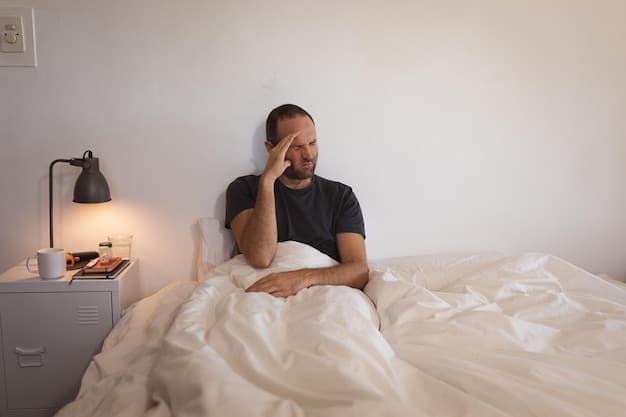Understanding The Link Between Mental Health and Sexual Performance

The link between mental health and sexual performance is significant, with anxiety often playing a central role. Understanding this connection is key to overcoming sexual performance issues and improving overall well-being.
Many individuals experience the frustrating intersection of mental health and sexual performance. Anxiety, stress, and depression can significantly impact sexual desire, arousal, and overall satisfaction. Understanding the link between mental health and sexual performance is the first step toward addressing these challenges.
Exploring the Connection: The Link Between Mental Health and Sexual Performance
The intricate relationship between the mind and body is critical in understanding sexual health. Mental health conditions like anxiety, depression, and stress can directly affect sexual function and satisfaction. Let’s delve into how these conditions impact sexual performance and overall well-being, exploring the link between mental health and sexual performance.
Anxiety and Sexual Dysfunction
Anxiety can manifest in various ways, impacting different stages of the sexual response cycle. Performance anxiety, in particular, is a common issue where the fear of not performing well leads to actual difficulties. This can create a self-fulfilling prophecy, exacerbating the problem.
- Erectile Dysfunction (ED): Anxiety can constrict blood vessels, making it difficult to achieve or maintain an erection.
- Premature Ejaculation (PE): Heightened anxiety can lead to a faster time to ejaculation.
- Low Libido: Stress and worry can decrease sexual desire.
- Difficulty Reaching Orgasm: Anxiety can create a mental block, making it challenging to relax and enjoy the experience.

The stress response, triggered by anxiety, releases hormones like cortisol, which can interfere with sexual function. Chronic stress can lead to hormonal imbalances that further contribute to sexual difficulties. Addressing underlying anxiety is therefore crucial for improving sexual performance.
The Role of Depression in Sexual Well-being
Depression is another significant mental health condition that often impacts sexual health. The symptoms of depression, such as low energy, loss of interest, and feelings of hopelessness, can directly affect sexual desire and performance. Let’s break down the link between mental health and sexual performance specifically related to depression.
How Depression Affects Sexual Function
Depression can lead to a decrease in libido, making sexual activity less appealing. Additionally, some antidepressant medications can have side effects that further impair sexual function. It’s essential to discuss these concerns with a healthcare provider.
- Reduced Sexual Desire: A common symptom of depression is a loss of interest in activities once enjoyed, including sex.
- Erectile Dysfunction: Depression can affect nerve function and blood flow, contributing to ED.
- Delayed Orgasm: Some individuals may experience difficulty reaching orgasm due to depression.
- Painful Intercourse: Depression can increase sensitivity to pain, making intercourse uncomfortable.
Overcoming the sexual side effects of depression often requires a multifaceted approach, including therapy, medication management, and lifestyle changes. Seeking professional help is paramount for addressing both the mental health and sexual health aspects of depression.
Practical Strategies for Overcoming Anxiety-Related Sexual Issues
Addressing the mental component is key to improving sexual performance when anxiety is involved. Various strategies can help individuals manage anxiety and enhance their sexual experiences. One of the key elements is understanding the link between mental health and sexual performance to apply tailored solutions.
Mindfulness and Relaxation Techniques
Mindfulness practices, such as meditation and deep breathing exercises, can help reduce anxiety and promote relaxation. Practicing these techniques regularly can improve overall mental well-being and enhance sexual experiences.
For example, focusing on the present moment during sexual activity can help reduce performance anxiety and increase pleasure. Deep breathing exercises can calm the nervous system, facilitating arousal and orgasm. These techniques provide practical tools for managing anxiety in the bedroom.
Communication and Intimacy
Open and honest communication with your partner is vital for addressing sexual concerns. Sharing your fears and desires can create a supportive and understanding environment, reducing performance anxiety. Intimacy extends beyond physical touch; it includes emotional connection and vulnerability.
- Talk About Your Feelings: Discuss your anxieties and concerns with your partner.
- Practice Active Listening: Pay attention to your partner’s needs and desires.
- Experiment Together: Explore different activities and techniques to find what works for both of you.
Creating a safe and supportive space for sexual exploration can alleviate anxiety and enhance pleasure. Remember, the goal is to enjoy each other’s company and connect on a deeper level.
Seeking Professional Help: Therapy and Counseling
Sometimes, self-help strategies are not enough to address the underlying issues contributing to anxiety and sexual dysfunction. Seeking professional help from a therapist or counselor can provide valuable support and guidance. Recognizing the link between mental health and sexual performance empowers individuals to seek appropriate treatment.

Types of Therapy
Various types of therapy can be beneficial for addressing anxiety-related sexual issues. Cognitive Behavioral Therapy (CBT) helps individuals identify and change negative thought patterns. Sex therapy focuses specifically on sexual concerns, providing education and practical strategies.
Additionally, couples therapy can improve communication and intimacy, addressing relationship dynamics that may be contributing to sexual problems. Choosing the right type of therapy depends on individual needs and preferences. A mental health professional can help determine the most appropriate course of treatment.
Therapy offers a structured and supportive environment for exploring underlying issues, developing coping mechanisms, and improving overall mental and sexual well-being. It is a proactive step toward reclaiming control over your sexual health.
Lifestyle Changes to Support Mental and Sexual Health
In addition to specific strategies, adopting healthy lifestyle habits can significantly improve both mental and sexual health. These changes can reduce overall anxiety, promote relaxation, and enhance sexual function. Considering the link between mental health and sexual performance, integrating these habits into your daily routine can be highly beneficial.
Exercise and Nutrition
Regular physical activity has been shown to reduce anxiety and improve mood. Exercise releases endorphins, which have mood-boosting effects. A balanced diet rich in fruits, vegetables, and whole grains provides essential nutrients for optimal brain function and sexual health.
Additionally, limiting caffeine and alcohol intake can help reduce anxiety. These substances can disrupt sleep and exacerbate anxiety symptoms. Prioritizing a healthy lifestyle can positively impact both mental and sexual well-being.
Sleep Hygiene
Getting adequate sleep is crucial for managing anxiety and promoting overall health. Lack of sleep can increase stress hormones and impair cognitive function. Establishing a consistent sleep schedule and creating a relaxing bedtime routine can improve sleep quality. Avoid screen time before bed and create a quiet, dark, and cool sleep environment.
Improving sleep hygiene can have a cascading effect on reducing anxiety and enhancing sexual performance. A well-rested mind and body are better equipped to handle stress and engage in pleasurable activities.
In summary, understanding how the link between mental health and sexual performance: strategies for overcoming anxiety go hand in hand is important towards living a happy and healthy life.
| Key Point | Brief Description |
|---|---|
| 🧠 Mental Health | Anxiety and depression often affect sexual desire and performance. |
| 🗣️ Communication | Openly discussing concerns with your partner can reduce anxiety. |
| 🧘 Relaxation | Mindfulness and deep breathing can manage anxiety in the bedroom. |
| 💪 Lifestyle | Exercise, nutrition, and sleep enhance mental and sexual well-being. |
Frequently Asked Questions
Anxiety can cause physiological changes, such as increased heart rate and muscle tension, which can interfere with arousal and orgasm. Performance anxiety also adds psychological pressure.
Yes, some antidepressants and other psychiatric medications can have side effects that impact sexual desire, arousal, and orgasm. Discuss potential side effects with your doctor.
Open communication with your partner can ease anxiety and create a more supportive environment. Sharing your feelings and concerns can deepen intimacy and reduce performance pressure.
Yes, pelvic floor exercises (Kegels) can improve muscle control and blood flow, potentially enhancing arousal and orgasm. Deep breathing and mindfulness can also reduce anxiety.
If self-help strategies and lifestyle changes are not enough, or if your sexual difficulties are causing significant distress, seeking professional help from a therapist or counselor is advisable.
Conclusion
Understanding the link between mental health and sexual performance: strategies for overcoming anxiety will significantly improve overall well-being. By addressing the mental component of sexual health, individuals can experience greater satisfaction and intimacy.





